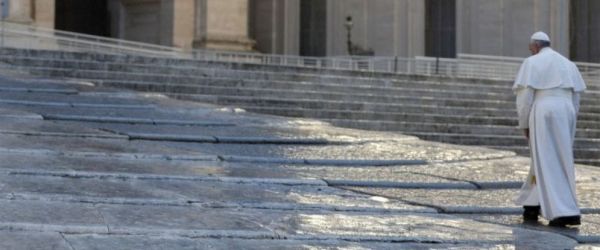Christians are persecuted today more than at the beginning of the history of Christianity. The root cause of all persecution is the hatred of the prince of the world towards those who have been saved and redeemed by Jesus through his death and resurrection. The only weapons to defend themselves are the word of God, humility and meekness.
Also this morning, Saturday 4 May, Pope Francis pointed out a way forward to learn how to untangle the pitfalls of the world. Insidies that, he explained in the homily of the Mass celebrated in the chapel of the Domus Sanctae Marthae, are the work of the "devil", "prince of the world", "spirit of the world".
The Pope, commenting on the day's readings taken from the Acts of the Apostles (16:1-10) and the Gospel of John (15:18-21), focused his reflection on hatred "a strong word - he stressed - used by Jesus. Hatred indeed. He who is a master of love, who liked to speak of love so much, speaks of hate'. But "he," he explained, "liked to call things by the proper name they have. And he tells us 'Do not be afraid! The world will hate you. Know that before you he hated me'. And he also reminds us of what he may have said on another occasion to the disciples: 'remember the word that I have spoken to you: a servant is not greater than his master. If they persecuted me, they will also persecute you'. The way of Christians is the way of Jesus'. To follow him there is no other. One of those marked by Jesus, the Holy Father pointed out, "is a consequence of the hatred of the world and also of the prince of this hatred in the world".
Jesus,' the Pontiff explained, 'chose us and "redeemed us. He has chosen us by pure grace. By his death and resurrection he redeemed us from the power of the world, from the power of the devil, from the power of the prince of this world. The origin of hatred is this: we are saved and that prince of the world, who does not want us to be saved, hates us and gives rise to the persecution that has continued from the early days of Jesus until today. So many Christian communities are persecuted in the world. In this time more than in the first times; eh! Today, now, in this day, in this hour. Why? But because the spirit of the world hates".
Usually persecution comes after a long, long road. "Let us think - Pope Francis suggested - of how the prince of the world wanted to deceive Jesus when he was in the desert: 'But be good! Are you hungry? Eat. You can do it'. He also invited him a little to vanity: 'Be good! You have come to save people. Save your time, go to the temple, throw yourself down and all the people will see this miracle and it is all over: you will have authority'. But let us consider this: Jesus never answered this prince with his words! Never. He was God. Never. He went, for the answer, to find the words of God and answered with the word of God'. A message for the man of today: "With the prince of this world you cannot converse. And let this be clear'. Dialogue is something else: 'it is necessary between us,' explained the bishop of Rome, 'it is necessary for peace. Dialogue is a habit, it is precisely an attitude that we must have among ourselves to hear each other, to understand each other. And it must always remain so. Dialogue comes from charity, from love. With that prince you cannot dialogue; you can only respond with the word of God that defends us'. The prince of the world, he reiterated, 'hates us. And as he did with Jesus he will do with us: 'But look, do this... it's a little scam... there's nothing to it... it's small' and so he starts to take us down a slightly unjust road. It starts with small things, then begins with flattery and with it "softens us up" until "we fall into the trap. Jesus told us: "I send you out as sheep in the midst of wolves. Be prudent, but simple'. But if we allow ourselves to be taken in by the spirit of vanity and think we can fight the wolves by making ourselves wolves, 'they will eat you alive'. Because if you stop being a sheep, you have no shepherd to defend you and you fall into the hands of these wolves. You might ask: "Father, but what is the weapon to defend oneself against these seductions, these fireworks that the prince of this world makes, against his flatteries?" The weapon is the same as Jesus': the word of God, and then humility and meekness. Let us think of Jesus when he was slapped: what humility, what meekness. He could have insulted and instead asked only a humble and meek question. Let us think of Jesus in his passion. The prophet says of him "like a sheep going to the slaughterhouse, he cries out nothing". Humility. Humility and meekness: these are the weapons that the prince of the world, the spirit of the world does not tolerate, because his proposals are of worldly power, proposals of vanity, proposals of riches. Humility and meekness does not tolerate them'. Jesus is meek and humble of heart and 'today,' he said as he drew to a conclusion, 'it makes us think of this hatred of the prince of the world against us, against the followers of Jesus'. And let us think about the weapons we have to defend ourselves: "let us always remain sheep, because then we will have a shepherd to defend us".
[Pope Francis, S. Marta homily, in L'Osservatore Romano 05/05/2013]












